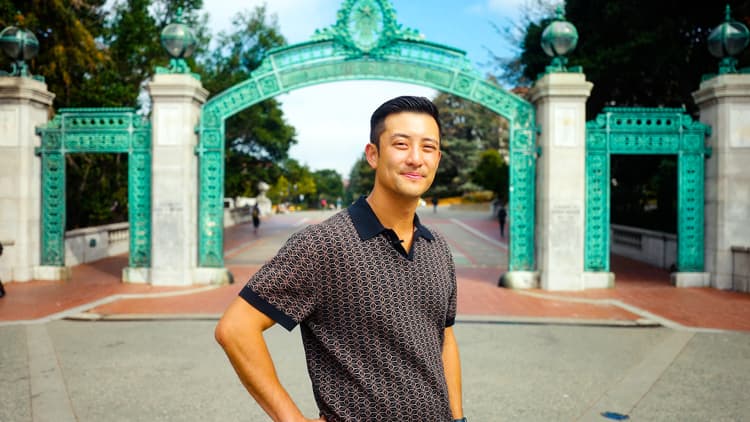Maurice Bachelor wants to change people's opinions about artificial intelligence bots. Billionaires Mark Cuban and Michael Rubin are up for the challenge.
On Friday's episode of ABC's 'Shark Tank,' Bachelor pitched his Los Angeles-based company Bot-It alongside Joel Griffith, his founding partner and head of growth. Bot-It is a website and mobile app that uses AI to help people automate online tasks like booking appointments or making restaurant reservations, they said.
A "pro" subscription can also be used to help people jump the line for sneaker release draws, or snag concert tickets in "seconds," said Bachelor, the company's lead software engineer. That makes it a somewhat controversial business: Bots have tarnished the shopping experiences of consumers across the world, including in those specific industries — sneakers and live events.
"This is a real issue," said Rubin, the CEO of sports retailer Fanatics and a guest judge on the episode. "We have probably billions of dollars of products that bots try to buy from us each year ... Bots come to get everything."
"What does it say about us if we're supporting this, for those that think you're cheating?" Kevin O'Leary added.
Bachelor and Griffith, who asked for $150,000 in exchange for a 10% equity stake in their business, said their technology actually helps individuals circumvent cheaters by getting real people in front of faceless bot armies.
"We want to help change the perception of bots amongst consumers," Griffith said. "Bots aren't always the bad guy. You can have one, too."
The argument resonated with Rubin, who said that most of the bots on Fanatics' platform are large-scale attempts to buy up new products, likely to resell them on third-party platforms at a high markup. Arming consumers with bots could help give regular people a fighting chance to buy items at fair prices, he surmised.
"I'd rather disrupt myself than have someone else disrupt me," said Rubin.
Yet Cuban was the first investor to make an offer, intrigued by Bot-It's artificial intelligence platform, which helps it carry out tasks in seconds.
"With all the new AI stuff that's coming out, people are going to be more aware and more interested in doing these types of things if you can create the right interface," Cuban said, offering $150,000 for 20% equity.
Rubin stepped in, asking Cuban, "Would you have me as your partner?"
"No, I like this," Cuban responded. "I want these guys all to myself."
Rubin promptly offered $50,000 for 15% of Bot-It, marking a higher valuation than Cuban's offer. "It's a Shark fight," O'Leary exclaimed. "It's the battle of the billionaires."
Bachelor and Griffith, caught between their options, implored Cuban and Rubin to make a joint deal. The billionaires agreed, offering $300,000 for 30% of the company. After some hesitation about the size of the equity stake, the Bot-It duo accepted the deal.
"This is the most important day of the Bot-It life," Bachelor said. "To have both of those Sharks on our team right now is going to take us to the next level."
Disclosure: CNBC owns the exclusive off-network cable rights to "Shark Tank."
DON'T MISS: Want to be smarter and more successful with your money, work & life? Sign up for our new newsletter!
Want to earn more and land your dream job? Join the free CNBC Make It: Your Money virtual event on Oct. 17 at 1 p.m. ET to learn how to level up your interview and negotiating skills, build your ideal career, boost your income and grow your wealth. Register for free today.



